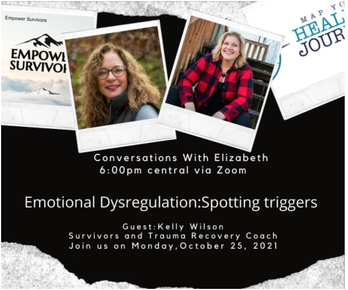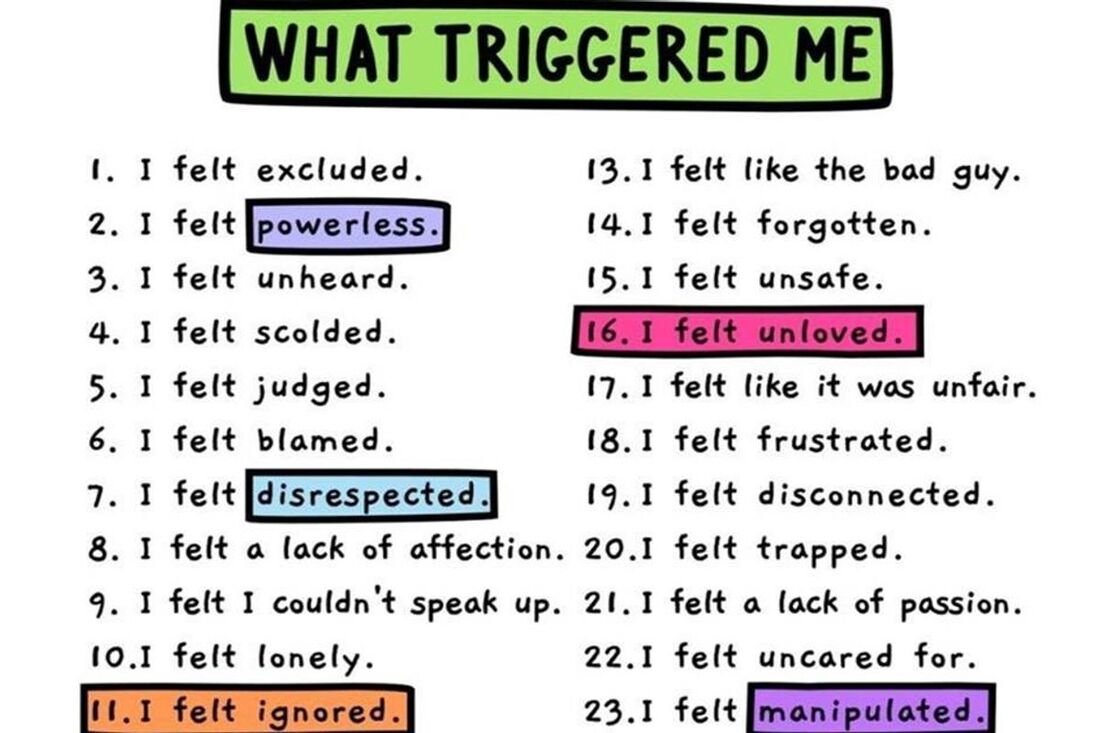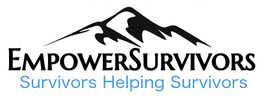|
Staying Sane During The Holidays EmpowerSurvivors is a 501(C)(3). All Rights Reserved. © 2022 www.EmpowerSurvivors.net ****Trigger Warning ***** Holidays can be a hard time for survivors of childhood sexual trauma and abuse. For many, it may mean reminders of past childhood abuse or knowing that the person that perpetrated them will be gathered alongside family members. This may leave you feeling a sense of loss and thoughts of why, why would my family still include the person that hurt me, took my innocence, and caused so much pain. Many survivors feel forced to attend holiday events simply because the people asking are “family”. Survivors may be asked by family members why they are still holding on to something that happened years ago or guilt-tripped and told “ you need to forgive, let it go” or other statements that only make the survivor feel betrayed, abandoned, unloved, and unsupported. As survivors, we know that sexual trauma and abuse are not something you just “ get over” but rather something that needs to be processed in a loving and supportive environment. Each survivor is unique so healing can look different depending on the situation. All survivors deserve support and that includes everyone reading this. How To Stay Sane: 1) Love yourself Give yourself the grace and love that you truly deserve. Go easy on yourself and know that whatever you are feeling is okay. You matter and so do your feelings and experiences. Take time to rest, buy yourself a present, and invest in yourself. 2) Surround yourself with positive and healthy supporters Building a strong support system around yourself is very important. This could include trauma therapists, fellow survivors, peer groups, or those in your life that have supported you on your healing journey. Have a code word for your partner that gives your partner the notice that it may be time to leave a situation or get together that is toxic. 3) Get enough rest, drink water, and watch what you are eating. Sleep is an important factor in life. Without adequate rest, our systems tend to break down. Getting enough sleep can help you handle the stresses of the holidays easier. Stress wears us thin, so healthy eating habits and drinking water can help us regulate our systems and stay healthy. Good nutrition can lead to less depression and an overall healthier lifestyle. 4) Learn or enforce healthy boundaries Think of boundaries as your property line. Boundaries help you to stay safe, is a form of self-care, create realistic expectations, and create safety. If someone crosses your boundary let them know what your expectations are, how they broke your boundaries, and help you advocate for yourself. 5) Know you are not obligated to attend functions simply because they're family. How many times have you been to a gathering that you felt obligated to attend simply because of “ family”? Give yourself permission to decline invitations where your perpetrator is attending or those that have not been supportive. 6) Learn that saying No is okay Many people struggle with saying, "No." Many people have a knee-jerk reaction to say “yes” when they're asked to do someone a favor. Keep in mind, you are never required to say "Yes." It's actually okay to say "No" sometimes. Accept this as you prepare to say "No" to someone. This will help you say "No" with ease. When saying “yes” make sure you are not saying no to yourself. 7) Fight the negative messages Watch your stinkin thinkin! So many times we have negative messages telling ourselves we are being selfish, not worthy, not deserving of love, etc. These are all lies and many times have been put there by our perpetrators or those in our family unit or well-intended friends. Every time you get a negative thought, notice it but kick it out quickly with a positive affirmation. Instead of saying “I am not worthy” replace it with “ I am fearfully and wonderfully made and worthy of much”. Become the person you needed as a child. 8) Create New Traditions Sometimes the abuse we suffered at the hands of others has found us all alone. Creating new traditions can help bring joy back into your life. Have your own party, celebration, or holiday tradition that is only attended by healthy individuals and those that support your healing journey. Volunteer at a food shelf, local school, or soup kitchen, visit the elderly in a nursing home, aid in others' healing, and get creative. You have the power within you to begin new traditions. No matter your situation please know you are not alone, there are many of us out here that celebrate you and your healing. If you are in need of more support please feel free to join one of our Facebook groups that support those that were sexually traumatized and abused in childhood. Together we can find healing and once again find joy. If in immediate danger please call 911 or your local crisis center. Written by: Elizabeth Sullivan, Founder & CEO of the EmpowerSurvivors 501c3 nonprofit. EmpowerSurvivors wishes you and your families much peace and love during this holiday season.
If you would like to support EmpowerSurvivors, the survivors we support, our programs, groups, and classes please consider a donation this holiday season. We look forward to serving you in 2023 and will be announcing new classes and groups soon! Donate today through PayPal, through AmazonSmiles, Facebook fundraisers, or by simply sending a check. We appreciate all who donated in 2022!! Without YOU we could not serve those we hold so dearly. Donations Through Paypal: Select a one-time donation or support us monthly for more impact! https://www.paypal.com/biz/fund?id=MRU3VP4L3KSFU AmazonSmiles Shop at https://smile.amazon.com/ and Amazon will donate 0.5% of eligible purchases to EmpowerSurvivors nonprofit organization—no fees, no extra cost. Simply choose EmpowerSurvivors as your charity! Facebook Fundraisers Go to https://www.facebook.com/EmpowerSurvivors/fundraisers and click on raise money. 100% of the donations will go to supporting EmpowerSurvivors! Mail Check To: EmpowerSurvivors 815 Oak Street West Stillwater, MN 55082
0 Comments
Join us October, Monday 25th at 6pm CT for "Conversation with Elizabeth" with our special guest Kelly Wilson talking about Emotional Dysregulation: Spotting Triggers. Register here to participate. If you cannot attend the live meeting subscribe to EmpowerSurvivors podcast here and get notified when the recording of this program will be published! Available on youtube, google podcast, amazon music and IHeart Radio About Kelly Wilson is a mom, award-winning author, comedian, speaker, and trauma recovery coach who educates inspires, and helps people explore their journeys of hope and healing out of complex trauma, specializing in PTSD recovery. As a survivor of childhood sexual abuse, Kelly writes and speaks about finding hope in the process of recovery. Through both stand-up and improv comedy, she brings laughter to audiences of all ages using a wide range of subject matter, including silly songs, parenting stories, and jokes and anecdotes revolving around mental health issues. Books Kelly Wilson is the author of Caskets From Costco, a finalist in the 18th annual Foreword Reviews’ INDIEFAB Book of the Year Awards, a finalist in the 10th annual National Indie Excellence Book Awards, and has also been chosen as a finalist in the 2016 Readers’ Favorite International Book Award Contest. She has also written and published numerous articles, poems, and short stories for children and adults in a wide range of publications, including Huffington Post and Sweatpants & Coffee. Podcast Kelly is the co-founder of two organizations: PTSD Parent and Mental Health at the Mic. The PTSD Parent Podcast is a fun podcast about serious stuff that explores what it’s like to have PTSD and navigating the important relationships that make life worthwhile. With Mental Health at the Mic, Kelly performs and teaches people whose lives have been touched with mental illness how to write and perform stand-up comedy. Find out more about Kelly at MapYourHealing.com. Map Your Healing on Social Medias
In relation to trauma, a trigger is something that calls to mind a previous traumatic situation and may provoke a flashback of the event. Therapists suggest that triggers can vary person to person, and are dependent on an individual’s personal, and often private, experiences. It may be hard to predict what may be a trigger for you or a loved one, however, the more attention you pay to identifying triggers, the easier it may become to predict, control, or manage their effects.
Types of triggersTriggers can be divided into different categories, including those based on our senses. Common categories of triggers may include:
Managing TriggersThere are various approaches to managing triggers. Although everyone’s triggers may be different, there are common tips that can be used to deal with them in a healthy manner. These include, but are not limited to:
By Evey Krammer-Carlson I make a conscious effort to be careful about what I read and listen to on the news. It’s a tricky line to walk sometimes because I’m inherently curious and interested in what is happening in current events around the world. I don’t want to live in a bubble. I want to know what’s happening, I want to be able to critically think about things so I can form my own opinions and have thoughtful conversations. When my symptoms were at their worst, and I was going through the throes of processing my memories, my therapist had me follow the “puppy and kitten rule,” meaning I could watch anything as long as it included cute puppies and kittens. That “rule” helped me minimize being triggered at a time when most of my days were spent experiencing flashbacks, anxiety, panic, and fear. I stayed away from intense news and was mindful of what I watched on tv and what movies I saw. Most of the time, I watched lots of comedy. Admittedly, there were times when I broke the rule. I sometimes sought out programs with violence that in some way mirrored my own abuse. Or I would pay attention to sensationalized cases in the media that were hard to avoid. Inevitably I would get triggered. As I began to manage my symptoms and felt some sense of safety the puppy/kitten rule was lifted. Because I had been so careful about what I ingested from media outlets for so long, I developed an avoidance for watching or seeking out certain information because I knew it may be triggering. Recently, there was a news story that I had done my best to avoid. When it first came out, people were outraged, and then the news cycle changed. I understand why that happens. There is so much out there every day, and each event is shocking and sad, and sometimes incomprehensible. But because my trauma is sort-of similar to the aforementioned news story, I was on high alert when I scrolled past it. I had a definite curiosity about the details but hadn’t read anything besides the headlines. Until the other day! The other day the headline changed and I knew that the very thing I feared when I first heard the story did, in fact, come true. I knew this person would never be convicted. I felt sick that even with awareness, this kind of trafficking still goes on, and in my mind, will probably continue to exist. Then I got triggered. I’m not used to those kinds of triggers any longer. There is plenty for me to navigate in my daily life, and anniversary times of the year, and I thought I was far enough along in my healing journey that I would be okay. But PTSD doesn’t operate that way. It doesn’t care that I was just reading an article, and it doesn’t care that this person had absolutely nothing to do with me. I had never heard of him. PTSD simply understands that my sense of safety and trust is altered because of the trauma I experienced, and my brain and body will go into the memory and protection mode automatically. After reading the article, I could tell that something was awry in my body/mind/spirit. I could tell things were stirred up in a way that I could spiral down the cycle of panic, fear, and shame. I closed the computer, went to yoga, had lunch with a friend, and remembered that today is a day when I’m fighting the tiger. Any shame over being triggered dissipated as I repeated my metaphorical mantra of support to myself. Seeing things written, or in movies, tv, or media can bring a sort of validation. A sense of see? I’m not making this up! When you are a trauma survivor you look for validation. My trauma seems so “out of the ordinary” that it’s extremely rare that I felt validation. But, my job on my healing journey is knowing that my truth is validation enough. I suspect there will be other times when I get triggered by the news. The intensity of my response will probably vary depending on what the triggers are, the time of year, and the present stressors in my life. I know what to do when the skeleton hands of the past pull at me, and I’m confident that I’ll remember that I will fight the tiger and win. On Healing Trauma, respected therapist and teacher Peter A. Levine brings you face to face with his effective new treatment - not a "talking" cure, but a deep physiological process for releasing your past traumas and instilling a harmonious awareness of your body. Are you experiencing physical or emotional symptoms that no one is able to explain? If so, you may be suffering a traumatic reaction to a past event, teaches Levine. Medical researchers have known for decades that survivors of accidents, disaster, and childhood trauma often endure life-long symptoms ranging from anxiety and depression to unexplained physical pain and harmful "acting out" behaviors reflecting these painful events. As a young stress researcher at the university of California at Berkeley, Levine found that all animals, including humans, are born with a natural ability to rebound from these distressing situations. Researchers have shown that survivors of accidents, disaster, and childhood trauma often endure lifelong symptoms ranging from anxiety and depression to unexplained physical pain, fatigue, illness, and harmful "acting out" behaviors. Today, professionals and clients in both the bodywork and the psychotherapeutic fields nationwide are turning to Peter A. Levine's breakthrough Somatic Experiencing® methods to actively overcome these challenges.In Healing Trauma, Dr. Levine gives you the personal how-to guide for using the theory he first introduced in his highly acclaimed work Waking the Tiger. Join him to discover: how to develop body awareness to "renegotiate" and heal traumas by "revisiting" them rather than reliving them; emergency "first-aid" measures for times of distress; and nature's lessons for uncovering the physiological roots of your emotions. "Trauma is a fact of life," teaches Peter Levine, "but it doesn't have to be a life sentence." Now, with one fully integrated self-healing tool, he shares his essential methods to address unexplained symptoms of trauma at their source―the body―to return us to the natural state in which we are meant to live Includes 12 guided Somatic Experiencing® exercises. If you or someone you know is dealing with a challenging situation and could benefit from additional support, consider talking to one of the 2,000 licensed online counselors at BetterHelp. Emotional abuse is a severe form of psychological trauma. It’s otherwise known as mental or psychological abuse; however these terms refer to the same concept. Unlike physical abuse, emotional abuse doesn’t leave visible scars. That doesn’t mean that it isn’t damaging. When a perpetrator abuses a victim emotionally, they use several forms of manipulation to control the person. Abusers break down their victim’s self-esteem to the point where they feel worthless. When a victim believes that they don’t deserve love, they are at the whim of their abuser. The perpetrator may engage in name calling, shaming, and telling the abused person that they’re unlovable. Threats are a large part of the emotional or mental abuse. The abuser tells their victim that they won’t be able to do better or find love. The victim often hides the mental or emotional abuse from friends and family because they are ashamed. However, there are some signs to indicate emotional abuse is happening. If you think someone you love is a victim of abuse, don’t ignore that intuition. Check in with them and see if they need help. You could save a life. IMPORTANT: The information in this video is not intended or implied to be a substitute for professional medical advice, diagnosis, or treatment. All content, including text, graphics, images, and information contained in this video is for general information purposes only and does not replace a consultation with your doctor. |
Archives
May 2024
Categories
All
|








 RSS Feed
RSS Feed